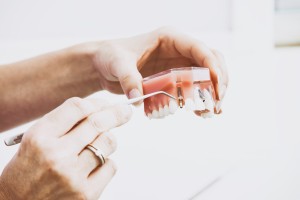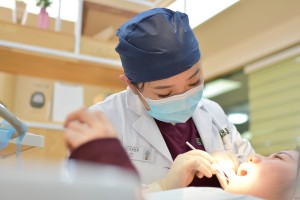You might not realize it, but over the past few years, a great deal of progress has been made in implant dentistry. This is great, but it has unfortunately given rise to peri-implant disease.
 We at Classic Denture Center are true believers in the saying that “it is true that you can’t prevent that which you cannot control.” For general dentists and specialists alike, this is a frustrating reality in cases of peri-implantitis, a serious problem that’s on the rise with an increasing number of implants placed annually.
We at Classic Denture Center are true believers in the saying that “it is true that you can’t prevent that which you cannot control.” For general dentists and specialists alike, this is a frustrating reality in cases of peri-implantitis, a serious problem that’s on the rise with an increasing number of implants placed annually.
Notably, official diagnostic criteria for peri-implantitis, which would be globally recognized by the dental community, have not yet been introduced. In fact, research on most of the features of peri-implant disease remains at an early stage. Still, clinical studies have shown a higher prevalence of peri-implantitis among patients who are chronically prone to the condition, have poor oral hygiene, or who choose not to maintain the implant site.
Tanya Poleon, L.D., your denturist in Portland OR fully understands that she can’t control patients’ personal habits, but she does want to give help where she can. One suggestion she has is to use products that promote osseointegration and hygienic healing for long-term stability.
To Rinse or Not to Rinse Before Implant Surgery?
Chlorhexidine mouth rinse is a well documented antibacterial rinse that has been shown to reduce infection and complications associated with dental implants.
A separate study concluded that chlorhexidine gluconate 0,2% mouthwash is an effective prophylactic material to prevent and treat oral pathogens in association with the implant prosthesis.
Antibiotics: Not Always the Answer
 Antibiotics are a controversial topic in implant dentistry. The pre- or postoperative use of antibiotics in conjunction with implant surgery and its correlation with failure and success rates are yet another poorly documented area in literature, according to researchers. While the benefits of prophylactic antibiotics are well recognized in dentistry, their routine use in the placement of endoosseous dental implants remains controversial.
Antibiotics are a controversial topic in implant dentistry. The pre- or postoperative use of antibiotics in conjunction with implant surgery and its correlation with failure and success rates are yet another poorly documented area in literature, according to researchers. While the benefits of prophylactic antibiotics are well recognized in dentistry, their routine use in the placement of endoosseous dental implants remains controversial.
A 2016 literature review concluded that prophylactic antibiotic treatment for each implant surgery is not mandatory, however, antibiotics are useful in preventing postoperative infections after implant placement.
According to this study, the accepted principles for the use of prophylactic antibiotics are as follows: The procedure should have significant risk for an incidence of postoperative infection; the appropriate antibiotic should be selected; the appropriate tissue concentration at the time of surgery is necessary, and the shortest effective antibiotic should be used.
Getting a Grip on Excess Cement
Cementing crowns, bridges, and fixed partial dentures onto implants has become increasingly popular, but not without issue. Dental cement is one cause of local tissue inflammation associated with dental implants. Cements have been linked directly to peri-implant diseases and have been blamed for bone loss and implant failure. This is especially concerning considering that it often takes a minimum of three years for bone loss to become easily discoverable.
The main point of this guide was to show you the ins and outs of dental implants. W hope it has helped you make some decisions about whether or not they are the right choice for you! If you have questions about your options or would like to discuss those options with your trusted denturist in Portland OR, contact us today. We are excited to help you create the smile you deserve!

